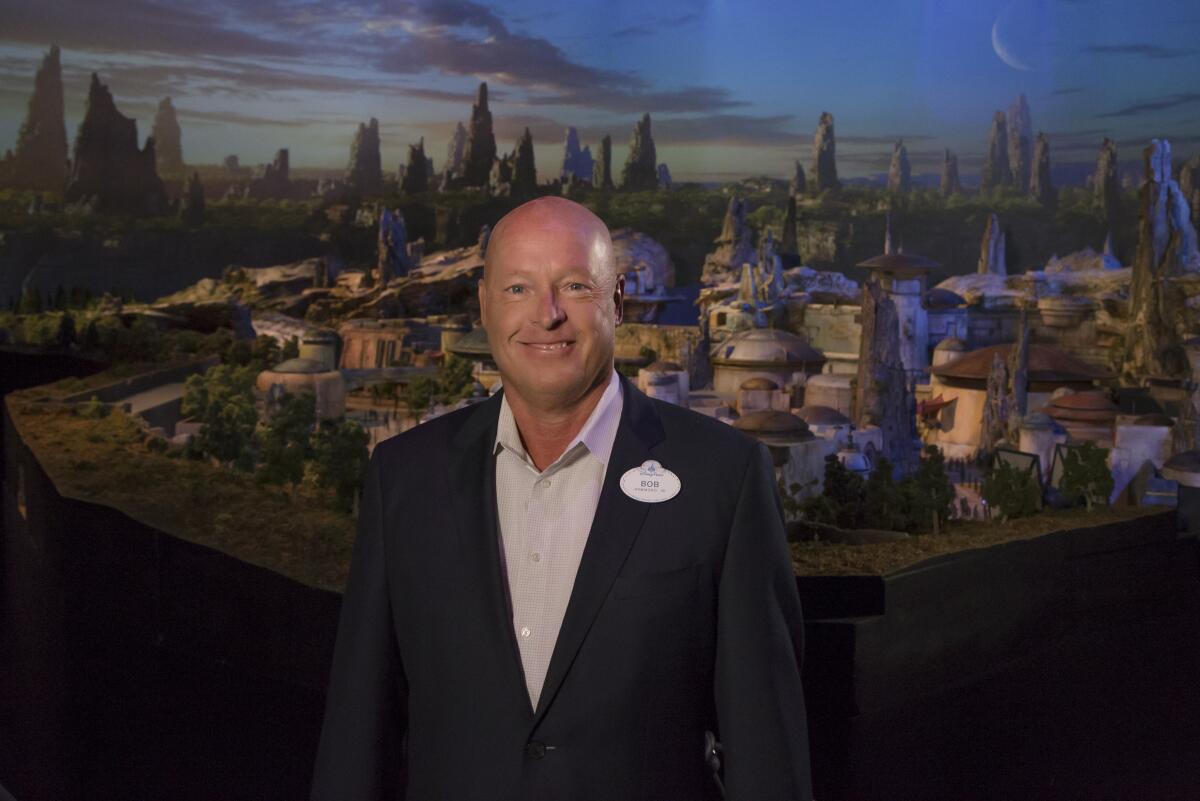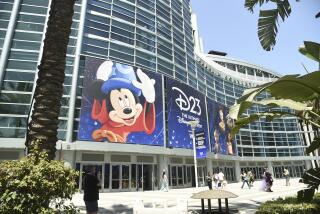From 2D to Web3: Disney is working on a metaverse game plan

Walt Disney Co. has brought its characters to life in its theme parks and expanded its franchises through streaming services.
Now it’s hoping to keep up with the times again by preparing for the internet’s next evolutionary leap.
The Burbank entertainment giant has begun developing a strategy for its approach to a future version of the internet that blends the physical with the digital and the virtual, dubbed by futurists, tech executives and investors as the metaverse, or Web3.
This week, Mike White, the Disney executive charged with leading the company’s foray in the space, met with senior Disney leaders to lay out the broad strokes of a metaverse strategy in terms of what they’re calling “next-generation storytelling,” according to people familiar with the talks who were not authorized to comment.
White has been meeting with leaders throughout various Disney businesses in recent weeks to establish a task force and develop early models for how to best approach the emerging technology, these people said.
This week’s meeting included top Disney leadership such as Disney Media and Entertainment Distribution Chair Kareem Daniel and Parks, Experiences and Products Chair Josh D’Amaro, plus creative executives from parks and Imagineering, Marvel, Lucasfilm and Industrial Light & Magic.
Disney Chief Executive Bob Chapek has strongly signaled his interest in the metaverse. Speaking to CNBC in February, Chapek called it a “third dimension of the canvas” for Disney creatives.
“[I]t’s going to take all the great things that we as a media company have with Disney+ and use that as a platform for the metaverse,” Chapek said. “But at the same time, we have something that no one else has, and that’s the physical world, a world of our parks. And so, if the metaverse is the blending of the physical and the digital in one environment, who can do it better than Disney?”
In 2020, a Disney parks executive published an essay on LinkedIn that hinted at a future in which wearable tech and smartphones would be used to “transcend the physical and digital barrier.”
Disney declined to comment for this story.
The specifics of what Disney’s strategy will look like are not yet formed. A key goal of the meetings is for Disney to figure out what it actually means when it talks about the concept, loosely defined as a new version of the internet based on decentralized digital ledgers known as blockchains.
One thing is becoming clear: Disney is not necessarily thinking about the metaverse in terms of creating full-fledged digital worlds in the way that Mark Zuckerberg and Facebook parent company Meta Platforms Inc. are trying to do. Don’t expect a VR hug from Mickey Mouse in a virtual park anytime soon.
Instead, White and Disney executives are thinking about ways to better connect physical spaces like the parks to digital ventures such as streaming service Disney+, as well as virtual environments as they emerge. How, for example, could Disney+ and the Disneyland app’s park navigation service, known as Genie, work together to make a more complete experience?
Chapek in February appointed White as senior vice president of next generation storytelling and consumer experiences. White, who joined Disney in 2011, previously held roles leading technology groups at Disney divisions including parks, products and experiences. Before Disney, White worked at the Apollo Group after spending a decade at Yahoo.
The company has already experimented with blockchain-based technologies such as NFTs, or nonfungible tokens, which are essentially unique computer code meant to authenticate ownership of items. Last year, for example, it unveiled a series of “Golden Moments” NFTs resembling statues inspired by stories from Disney, Pixar, Star Wars and Marvel.
Multiple entertainment companies are dipping their toes into metaverse technologies. Studios including Sony, Warner Bros. and Lionsgate took part in the NFT craze during the last year or so by minting collectibles related to their movies.
Former WarnerMedia CEO Jason Kilar earlier this year spoke to The Times about ideas for creating interactive worlds where fans can live and breathe the Wizarding World of Harry Potter virtually. (Kilar departed when Discovery took over WarnerMedia assets this month.)
Former Disney CEO Bob Iger, who retired from his post as executive chairman at the end of last year, recently invested in a company called Genies that makes avatars for virtual experiences.
Analysts have been split on metaverse hype in Hollywood. Some see it as a promising opportunity to expand entertainment franchises. Skeptics, though, worry that it’s just the industry’s latest buzzword and that the NFT market in particular is prone to grifts. Developing the technology has not been cheap or easy. Meta Platforms lost $10 billion on its metaverse business, Reality Labs, in 2021.
But Disney could be in a prime position to benefit from innovations that bring the internet to life through apps, virtual reality, augmented reality and NFTs.
The company is known for building physical worlds at Disneyland and Walt Disney World, like Star Wars: Galaxy’s Edge, that re-create the universe of the films for guests. In a world where people can go to virtual concerts and buy virtual clothes from virtual stores, Disney may spot opportunities.
Disney has a mixed track record when it comes to new technology. Its streaming service Disney+, launched in November 2019 to compete with Netflix, has already grown to about 130 million subscribers global subscribers.
Less successful efforts have included Disney’s $500-million purchase of the digital video creator network Maker Studios and the online video game Club Penguin. Unlike Warner Bros., Disney no longer publishes its own video games, choosing instead to license its properties to game makers. Gaming is essential to most people’s understanding of the metaverse.
In February, one analyst, speaking on a Disney conference call to discuss earnings, noted that software development has been one area in which the company has struggled. As Disney gets further into businesses including the metaverse and sports betting, that will have to change. Chapek said that making technology a core competency of the company would be “top of mind” as Disney expands.
“We realize that it’s going to be less of a passive-type experience,” Chapek said. “And this is a very top-of-mind thing for us because we are continuing over time to augment our skills and the types of people that we attract into the Walt Disney Company to reflect the aggressive and ambitious technology agenda that we have.”
More to Read
Inside the business of entertainment
The Wide Shot brings you news, analysis and insights on everything from streaming wars to production — and what it all means for the future.
You may occasionally receive promotional content from the Los Angeles Times.











